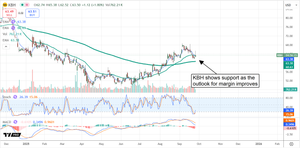— 51% of CFOs surveyed are optimistic about the U.S. economy
— 54% are confident their tax functions understand the benefits of One Big Beautiful Bill Act
— 45% said workforce reductions might be imminent
— 64% said tariffs have a negative effect on their business
A new survey from Grant Thornton, one of America’s largest brands of professionals providing end-to-end audit, assurance, tax and advisory services, shows that chief financial offers (CFOs) have displayed extreme agility, even as they navigate new challenges.
Grant Thornton’s Q3 2025 CFO survey, which polled over 230 finance leaders, revealed that while optimism has risen by 12 percentage points to 51% from 39% in Q2, finance leaders are still confronting new tax legislation, persistent tariff volatility and rising integration of artificial intelligence (AI) — all while seeking meaningful, measurable outcomes.
Q3 survey results also revealed double-digit increases in confidence from the previous quarter across key areas: meeting supply chain needs rose 20 percentage points to 57%, cost control confidence increased 13 percentage points to 50% and confidence in achieving technology objectives climbed 14 percentage points to 66%.
CFOs now need to make sure their businesses find the right answers to reap the full benefits from the One Big Beautiful Bill Act (OBBBA) by balancing tax, tariff and AI impacts to make optimal business decisions.
“You have to look at the hospitable environment in the U.S. from a tax positioning standpoint in conjunction with the tariff environment, technology and automation advancements,” said Mike Desmond, Audit & Assurance growth leader for Grant Thornton LLP. “Companies should completely reconsider their global footprint, infrastructure and total cost of operations on a net basis and determine the optimal layout for those operations and delivery of their services.”
Choosing the right tax path
According to CFOs, there’s still a fair amount of confusion related to the OBBBA, as just over half of finance leaders (54%) are confident their tax function understands how the OBBBA can benefit their business, and 42% say they might need to consult a third party for assistance.
David Sites, national managing partner of the Washington National Tax Office and International Tax Solutions for Grant Thornton Advisors LLC, said it’s a good time to streamline operations and perhaps work with a third-party provider to build the next-generation tax function.
“Take everything into account, including what’s going on in the global trade space,” he said. “You might reach different, more effective conclusions for your company.”
Dana Lance, national Tax Solutions leader for Grant Thornton Advisors LLC, noted that the only way to predict the best path is to do the math.
“The thing we keep telling our clients is to model, model, model and plan,” said Lance. “When you get into the details, the impacts of your strategic decisions can be interrelated, so you need to be detailed in your modeling to make sure you’re making the right strategic method election for your specific scenario and fact pattern.”
All in on AI
According to the Q3 survey findings, 54% of finance leaders plan to reinvest OBBBA-created tax savings into advanced technology, IT and digital transformation. With that in mind, it’s no surprise that CFOs are turning to AI implementation to drive business improvements amid the ongoing tax and tariff changes they’re experiencing.
This growing interest in AI reflects more than a push for automation; it signals a broader shift toward strategic transformation. As Paul Melville, national managing partner of CFO Advisory for Grant Thornton Advisors LLC, explains, the conversation around AI has become central to the CFO agenda.
“CFOs want to sit down and talk about AI,” said Melville. “They want to know how businesses are using it, how they’re hiring and training people to take advantage of it, and what it will mean for their operations. It’s a very big conversation.”
The survey also shows that financial operations and processes are finance leaders’ top priority for digital transformation, followed by business intelligence/data analytics and customer relationship management/customer experience.
The big question that needs to be answered is how much AI is contributing to possible workforce reductions. In Q2, when 47% of respondents predicted potential layoffs (a 14-quarter high), it was easy to attribute that spike to concerns over tariffs and recession fears. However, even after economic confidence has returned to historically average levels this quarter, 45% of respondents still said workforce reductions might be imminent at their organizations. The idea that AI might replace workers is no longer unspoken among business leaders; it’s starting to become a central part of the conversation.
Tariff responses and holistic planning
Although 64% of respondents now say tariffs have had a negative effect on their company (up from 56% in Q2), the improvement in economic optimism suggests that CFOs have learned to deal with the change.
“Finance leaders have come to understand that tariff uncertainty is a factor they will have to deal with, day in and day out,” Melville said. “They’re even prepared for large fluctuations in what the tariff numbers might be. It could be announced at 10% today and 20% tomorrow — and then the deadline is extended. Leaders understand the pattern for how all this works, and it’s less of a shock than it was in April.”
That growing familiarity is reflected in their top strategies for dealing with tariffs: adjusting supply chains (51%), implementing tech and automation (45%) and increasing prices (41%).
Building on that adaptability, Sites stressed that CFOs will get the best results when they tackle tariffs and other business issues in an interconnected fashion, not in isolation.
“Robust, forward-looking financial planning and analysis processes that integrate tax, treasury, sales forecasting and other important factors will enable companies to build offramps and create buffers,” Sites said. “Use this opportunity to build a safeguard for yourself with a defensive mechanism that provides balance amid all this uncertainty.”
To see additional findings from Grant Thornton’s Q3 2025 CFO survey, visit: https://www.grantthornton.com/insights/survey-reports/cfo-survey/2025/cfos-lean-in-on-taxes.
About Grant Thornton
Grant Thornton delivers professional services in the U.S. through two specialized entities: Grant Thornton LLP, a licensed, certified public accounting (CPA) firm that provides audit and assurance services ― and Grant Thornton Advisors LLC (not a licensed CPA firm), which exclusively provides non-attest offerings, including tax and advisory services.
In January 2025, Grant Thornton Advisors LLC formed a multinational, multidisciplinary platform. The platform offers a premier advisory and tax practice, as well as independent audit practices. With almost 60 offices, the platform delivers a singular client experience that includes enhanced solutions and capabilities, backed by powerful technologies and a roster of almost 13,000 quality-driven professionals enjoying exceptional career-growth opportunities and a distinctive cross-border culture.
Grant Thornton is part of the Grant Thornton International Limited network, which provides access to its member firms in more than 150 global markets.
Grant Thornton LLP, Grant Thornton Advisors LLC and their respective subsidiaries operate as an alternative practice structure (APS). The APS conforms with applicable laws, regulations and professional standards, including those from the American Institute of Certified Public Accountants.
“Grant Thornton” refers to the brand under which the member firms in the Grant Thornton International Ltd (GTIL) network provide services to their clients and/or refers to one or more member firms. Grant Thornton LLP and Grant Thornton Advisors LLC serve as the U.S. member firms of the GTIL network. GTIL and its member firms are not a worldwide partnership and all member firms are separate legal entities. Member firms deliver all services; GTIL does not provide services to clients.
View source version on businesswire.com: https://www.businesswire.com/news/home/20250924510535/en/
Contacts
Gina Mazzone
T +1 312 602 9096
E gina.mazzone@us.gt.com
S linkedin/grantthorntonus
twitter.com/grantthorntonus





